Commissioner's Foreword
Since the promulgation of the Law of the People’s Republic of China on Safeguarding National Security in the Hong Kong Special Administrative Region (Hong Kong National Security Law) in June 2020, our society has returned to order from chaos, allowing Hong Kong to move back to normality. However, the increasing number of people being remanded or sentenced for involvement in black-clad violence or contravention of the Hong Kong National Security Law, coupled with the rampant COVID-19 epidemic, posed formidable challenges to the Correctional Services Department (CSD) in the past year. That notwithstanding, correctional officers held fast to their duties and took resolute enforcement actions to ensure a secure and safe custodial environment. Besides, the Department continued to collaborate with stakeholders from various sectors to enhance its rehabilitation programmes and strengthen community education.
Custodial Work
Number of Admissions and Penal Population
In early 2020, many court hearings had to be postponed due to the epidemic. As the Judiciary has fully resumed processing backlog cases, more and more people involved in black-clad violence or violated the Hong Kong National Security Law have been remanded or sentenced. As a result, the annual number of new admissions (including convicted persons, remands and detainees) increased from 11 967 in 2020 to 15 311 in 2021, representing an increase of 28 per cent. The average daily penal population at correctional facilities also increased by 10 per cent from 6 902 persons in 2020 to 7 616 persons in 2021. The average daily occupancy rate was 68 per cent.
Among the 7 616 persons in custody mentioned above,
- 69 per cent were sentenced persons, 30 per cent were remands, and the remaining 1 per cent were persons detained under the Immigration Ordinance (2020: 72 per cent were sentenced persons, 28 per cent were remands and less than 0.5 per cent were detainees);
- 80 per cent were males and 20 per cent were females (similar to the corresponding figures in 2020);
- 94 per cent were aged 21 or above and 6 per cent were aged under 21 (2020: 96 per cent were aged 21 or above and 4 per cent were aged under 21); and
- 72 per cent were locals. Among the remaining 28 per cent non-locals, more than one third of them were from the Mainland, Taiwan or Macao (similar to the corresponding figures in 2020).
It should be noted that the average daily number of remands hit a decade high, from 1 388 in 2012 to 2 316 in 2021, representing an increase of 67 per cent. The highest single-day number of remands in 2021 stood at 2 473, representing an increase of 278 persons (13 per cent) from 2 195 persons in 2020.
The continued increase in the number of remands imposed a heavy burden on individual reception centres. Therefore, following the admission of some male remands to Stanley Prison, the Department also arranged for Tung Tau Correctional Institution to admit male remands aged 21 or above in 2021, with a view to further expanding the Department’s capacity for admitting remands. The Department will continue to closely monitor the changes in the penal population, and arrange for some remands to be transferred to other institutions in an orderly manner through flexible deployment of resources in order to relieve the overcrowding problem of individual reception centres.
Persons in Custody Involved in Offences under the Hong Kong National Security Law and Riot-related Offences
In 2021, the number of admissions to correctional institutions for involvement in offences under the Hong Kong National Security Law and riot-related offences (including unlawful assembly, possession of an offensive weapon, arson and taking part in a riot, etc.) stood high at 985 (101 of which were involved in offences under the Hong Kong National Security Law). Compared to 422 persons in 2020, the number of such admissions rose by 563 persons in 2021, representing an increase of 133 per cent. Among them, 467 were sentenced persons while the remaining 518 were remands.
The breakdown by age of the 985 persons mentioned above is as follows:
- 691 persons were aged 21 or above, including 334 sentenced persons and 357 remands; and
- 294 persons were aged under 21, including 133 sentenced persons and 161 remands.
Analysed by gender,
- 827 persons were males; and
- 158 persons were females.
Persons in Custody of High Security Risk
In 2021, 166 persons of high security risk (i.e. Category A persons in custody) were admitted, with 112 of them being convicted persons and 54 being remands, representing an increase of 33 convicted persons and a decrease of 1 remand respectively compared to 2020. Based on the penal population size as at 31 December 2021, the total number of Category A persons in custody was 564, representing an increase of 4 per cent as compared with the corresponding figure in 2020.
Escape Case
The Department has recorded no successful escape case for 14 years in a row from 2008 to 2021.
Self-harm by Persons in Custody
In 2021, a total of 44 self-harm cases were recorded, representing a significant drop by 32 per cent (21 cases) from 65 cases in 2020. While correctional officers were able to stop most of the self-harm cases in time, 1 male person in custody died despite rescue effort in 2021. The case has been referred to the Police for investigation and a subsequent death inquest will be conducted.
Order and Discipline
In 2021, the average daily penal population increased significantly as compared with the corresponding figure in 2020, and the number of disciplinary charges against persons in custody also increased accordingly. In 2021, the number of disciplinary charges against persons in custody was 5 269. Analysed by the penal population rate, there were 692 disciplinary cases per 1 000 persons in custody, representing an increase of 10 per cent as compared with 628 cases in 2020. The rate of increase in disciplinary charges was similar to that of the average daily penal population in 2021. The top three charges were “offending good order and discipline”, “possession of any unauthorised article” and “disobeying the orders of correctional officers”, which accounted for 31 per cent, 27 per cent and 18 per cent of the total number of disciplinary charges respectively.
As regards cases involving violent acts, a total of 455 cases were recorded in 2021, representing an increase of 32 cases (8 per cent) as compared with 423 cases in 2020. These cases mainly involved fighting among persons in custody and assaulting others. Among the 455 cases involving violent acts, 24 cases of a more serious nature (the same number as that in 2020) were referred to the Police for follow-up. The number of correctional officers who were injured while stopping violent acts was 12, which was similar to the corresponding number of 11 in 2020. An analysis revealed that the increase in violence cases among persons in custody was mainly due to the substantial increase in violence cases among female persons in custody, which surged from 28 cases in 2020 to 48 cases (71 per cent) in 2021. In these cases, 2 female persons in custody who were serving sentences for committing violent crimes were involved in repeated assault/fighting incidents for a total of 7 times.
Within 2021, there were 8 cases of concerted acts of indiscipline in correctional institutions, representing a decrease of 2 cases against 2020. These acts of indiscipline mainly involved fighting among persons in custody and collective actions against the management measures of correctional institutions, involving 118 participants in total. Among the 8 cases of concerted acts of indiscipline, 3 cases were collective hunger strikes which occurred in Tung Tau Correctional Institution (1 case) and Tai Tam Gap Correctional Institution (2 cases) respectively; 3 cases were group fights which occurred in Lai Chi Kok Reception Centre (2 cases) and Pik Uk Correctional Institution (1 case) respectively; and the remaining 2 cases were collective actions against the management in support of individual persons in custody, of which one occurred in Lo Wu Correctional Institution and another in Tung Tau Correctional Institution.
Among the persons in custody who were involved in black-clad violence or violated the offences under the Hong Kong National Security Law, some are radicals or highly educated people. Some of them attempted to use their influence to build up forces against the institutional management, posing threats to institutional order and discipline. Some even colluded with outside forces and made collective effort to smear the correctional system and various aspects of prison life in an organised manner and with scale. To tackle the above threats and challenges, the Department has adopted a “pre-emptive” strategy. In addition to enhancing the intelligence network and monitoring system, persons in custody were assigned to different correctional institutions according to their backgrounds, offences and influence under the established mechanism so as to prevent them from building up forces. If persons in custody are found to have committed acts of indiscipline, challenged institutional management through different means, or even endangered national security, correctional officers will promptly take resolute enforcement actions to maintain institutional order and discipline.
Enhancing the Emergency Response of Regional Response Team (RRT)
In 2021, the RRT carried out 19 operations to support the security work of correctional institutions, of which 5 were emergency security support operations at institutions, and 14 were crowd control operations within the court area. The number of high-risk escort cases increased from 302 in 2020 to 357 in 2021 (18 per cent).
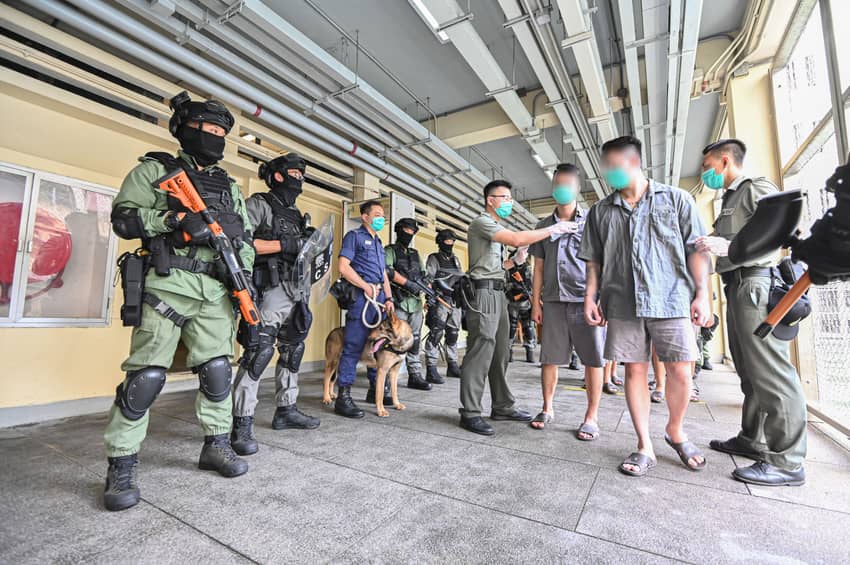
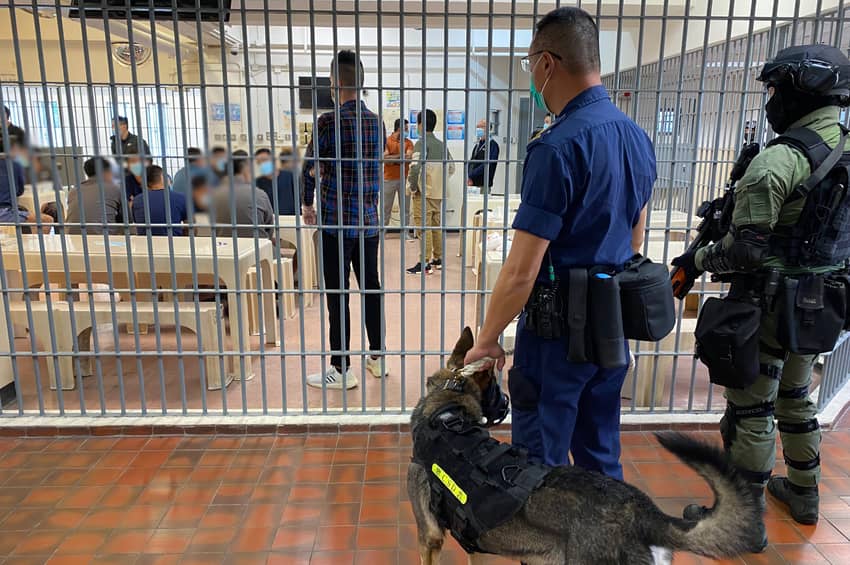
RRT and Dog Unit render support to the institutional management by combating illicit activities of persons in custody.
Besides, since 2021, the Department has vacated Cape Collinson Correctional Institution for use as the training base for RRT so as to further enhance their emergency response and the team spirit among RRT members during operations.
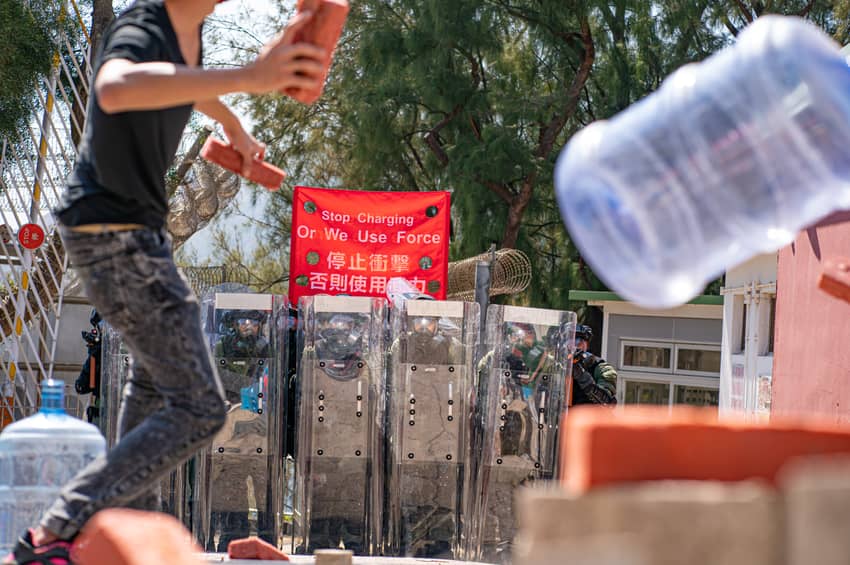
RRT receives training at Cape Collinson Correctional Institution.
Stepping Up Law Enforcement in Institutions
The CSD has adopted a “nip-in-the-bud” strategy to ensure a safe and secure custodial environment through strengthening intelligence collection capability and conducting search operations. In 2021, the Department conducted a total of 12 339 joint search/special search/night raid operations in institutions, covering 19 991 locations, representing increases of 28 per cent and 24 per cent respectively as compared with the corresponding figures in 2020.
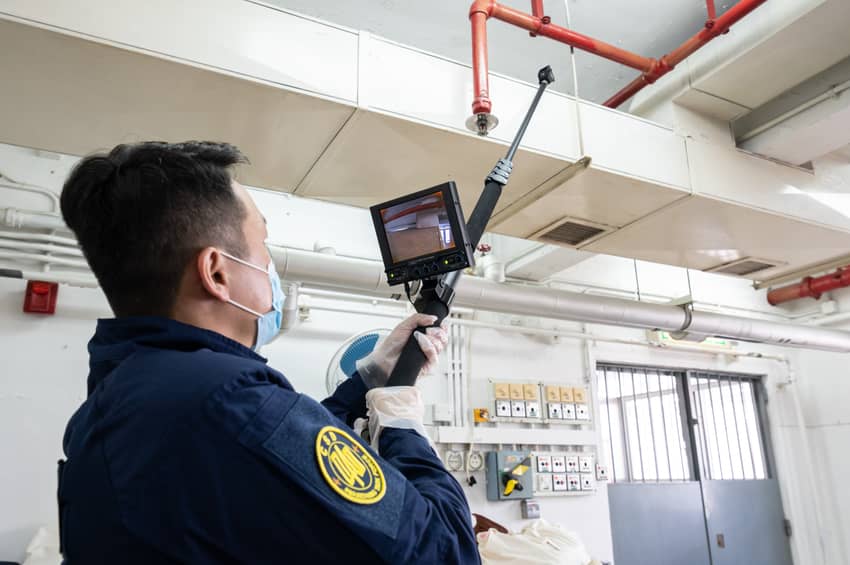
A security check is conducted in a correctional institution.
Meanwhile, the CSD spared no effort in stopping the smuggling of drugs into correctional institutions and continued to adopt a “zero-tolerance” strategy. In 2021, there were 13 cases of seized drugs, comparable to 14 such cases in 2020. Among these cases, 5 involved body-cavity concealment of drugs found in newly admitted persons in custody by using an X-ray body scanner; 2 involved drugs found in the mails sent to persons in custody; and the remaining 6 involved drugs seized during searches of personal property or clothing of newly admitted persons in custody. The seized drugs were mainly heroin and cocaine. The Department will continue to step up efforts in stamping out the smuggling of drugs into correctional institutions to ensure a safe and secure custodial environment.
Escorting Persons in Custody
In 2021, owing to the increase in the average daily penal population, the aging population, the rising prevalence of chronic diseases and the large number of persons in custody with a history of drug abuse, the demand for medical and healthcare treatment from persons in custody and the number of regular follow-up appointments arranged for them at public hospitals were increasing. The number of working days with medical escort duties increased from about 40 000 man days in 2020 to about 44 700 man days in 2021, representing an increase of 12 per cent. Among them, the number of working days on which persons in custody were escorted to the accident and emergency department of an external hospital for consultation and to public hospitals or clinics for follow-up appointments increased by 8 per cent (218 man days) and 17 per cent (3 705 man days) respectively compared with 2020. These figures show that the number of working days with medical escort duties is closely related to the penal population size.
Apart from performing medical escort duties, correctional officers are also required to escort persons in custody to courts for hearings. In 2021, given the increase in the number of cases heard by courts at all levels, correctional officers performed a total of 41 635 court escorts, and the highest single-day number of court escort cases reached 298, representing increases of 27 per cent and 9 per cent respectively as compared with the corresponding figures of 32 744 and 273 in 2020. The surge in the number of escort cases put a great strain on manpower resources and significantly increased the security risk.
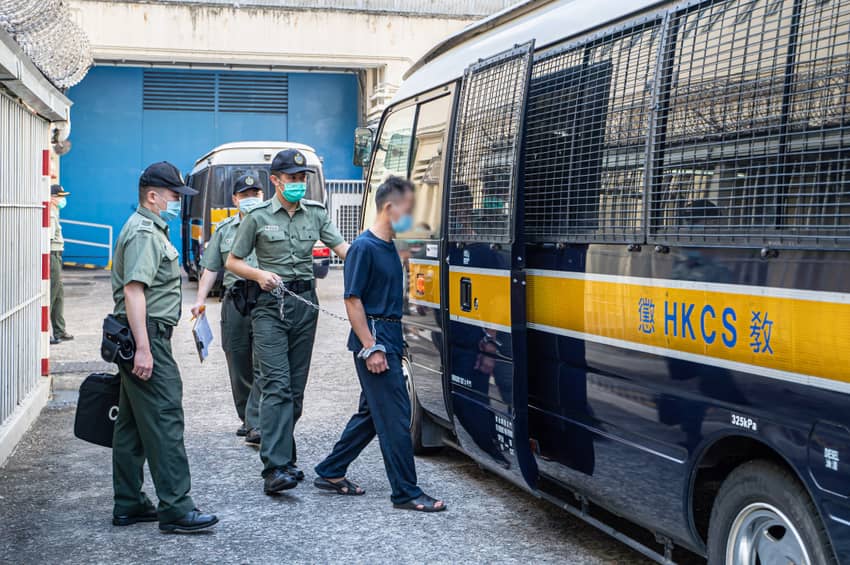
Correctional officers perform escort duties.
Rehabilitation
Psychological Counselling
In view of the social situation in recent years such as the fact that a large number of young people involved in black-clad violence or contravened the Hong Kong National Security Law have been admitted to correctional institutions, the CSD has launched a series of rehabilitation programmes to help these youngsters abandon radical thoughts and establish correct values, so as to prepare them for re-integration into society as law-abiding citizens. The Department would arrange for professionals including clinical psychologists to conduct psychological assessment for young persons in custody, and run relevant psychological counselling programmes such as the Youth Lab for young persons in custody to undergo psychological rehabilitation and rebuilding, so as to help them control their emotional impulses and think from multiple perspectives. Besides, clinical psychologists have designed various programmes such as the “Offending Behaviour Programme” and the “Breaking Free from Criminogenic Mindset Programme” to rectify young offenders’ criminogenic mindset and behaviours.
Clinical psychologists also deliver thematic talks from time to time during various activities in order to assist young persons in custody in mending their family relationships and enhancing their communication skills with family members. “Inmate-parent activities” and the “Walk with YOUth Programme” co-organised with the Hong Kong Police Force are examples of these initiatives.
In order to enhance the ability of young persons in custody to distinguish right from wrong and to prevent them from being misled by biased remarks, the Department has, in collaboration with a non-governmental organisation, organised the “Project Landing”, which aims at assisting persons in custody to de-radicalise, cultivate multi-perspective thinking, and develop empathy skills through group therapeutic sessions. The ultimate goal is to reduce the likelihood of their recidivism of violent crimes.
The Department also attempted to help young persons in custody in a spiritual way. On the basis of “arts therapy”, a professional photographer was invited to host the “Zen Photography Workshop” to make use of photography to guide young persons in custody to express their inner feelings, alleviate their negative emotions, help them de-radicalise and enhance their problem-solving skills.
As for adult persons in custody, clinical psychologists are actively planning a treatment programme named “Psychological Pathway to Change”. Through professional psychological counselling, persons in custody involved in riot-related offences will be guided to deeply reflect on themselves and cultivate positive behaviour and attitudes towards life, and will be provided with family therapy according to their needs. Through rebuilding family relationships, the programme will help prepare them for positive re-integration into society after release.
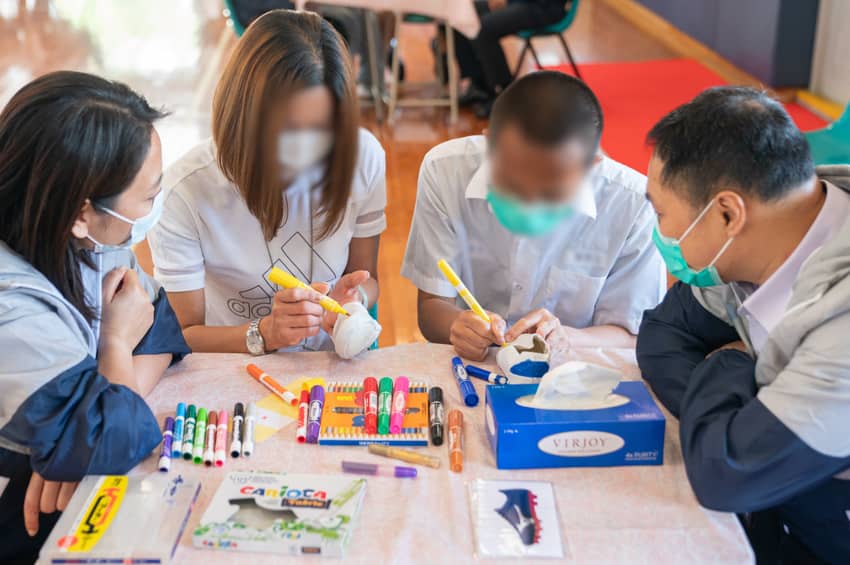
The Department has co-organised the “Walk with YOUth Programme” with the Hong Kong Police Force to assist persons in custody in strengthening communication with their families and improving family relationships.
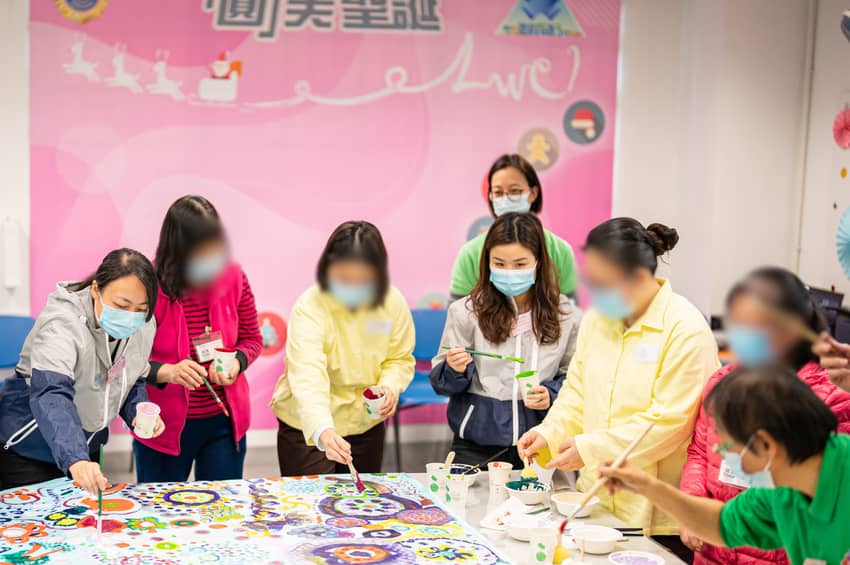
Persons in custody participate in an activity under the “Walk with YOUth Programme” to release negative emotions through art creation.
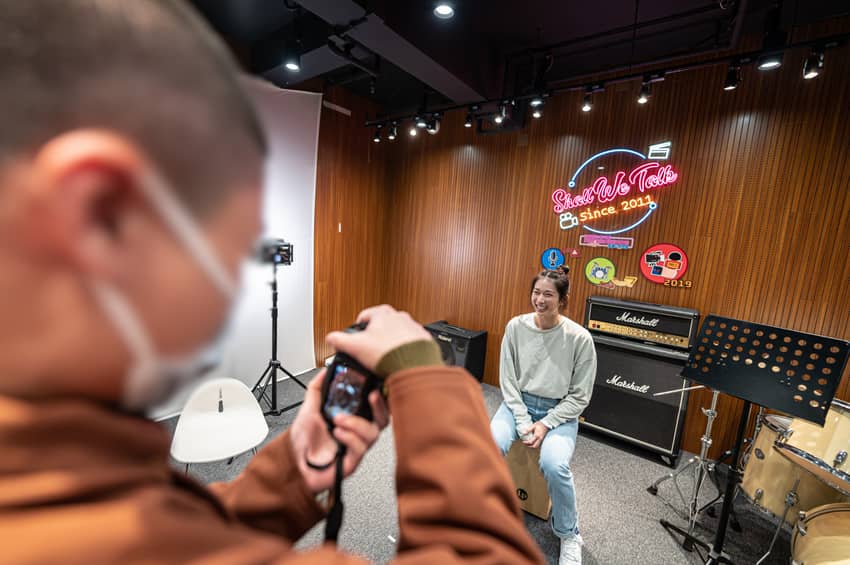
A young person in custody participating in the “Zen Photography Workshop” takes photographs of guest model Miss Vivian Kong.
To enhance the video visit and psychological counselling services of correctional institutions, the Department has started planning for the establishment of 4 multi-purpose family and rehabilitation service centres on Hong Kong Island and in the New Territories North, New Territories West and New Territories East respectively. These centres are expected to commence service progressively starting from the end of 2022. A community-based Change Lab will be set up in the centre at Shau Kei Wan to provide specialised psychological counselling service for young rehabilitated persons serving a supervision order to enhance their psychological resilience, and liaise with their parents and families to help them establish stable and healthy family relationships, with a view to guiding them to lead a positive life as they grow up.
Education
The Department has launched an educational programme entitled “Understanding History is the Beginning of Knowledge” to assist young persons in custody to learn Chinese history, enhance their sense of national identity, help them reflect on the meaning of life; and get back on the right track. Under this programme, various educational activities are organised for young persons in custody, including talks on history and culture delivered by different scholars at correctional institutions, virtual reality history learning activities, e-sports activities for learning history, history and culture workshops and activities for learning traditional culture such as Cantonese opera and papermaking. Through these diversified educational activities, young persons in custody could learn about the long history and rich culture of China and appreciate the beauty of Chinese culture in an interesting way.
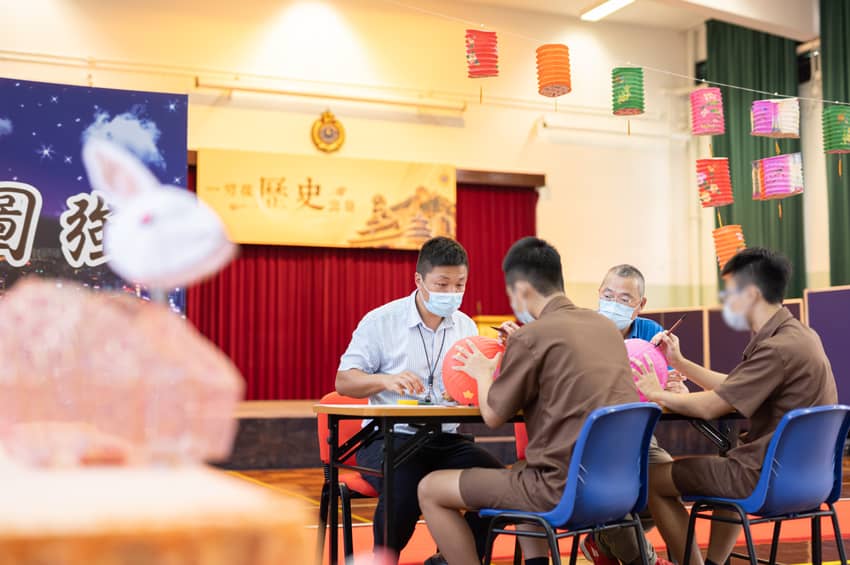
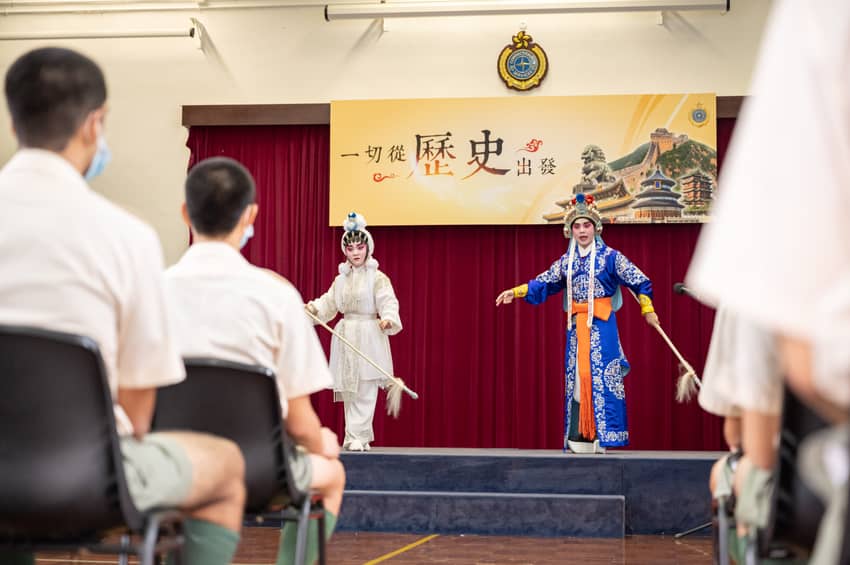
The Department has implemented an educational programme entitled “Understanding History is the Beginning of Knowledge” for young persons in custody to raise their interest in Chinese history and culture, and enhance their sense of national identity.
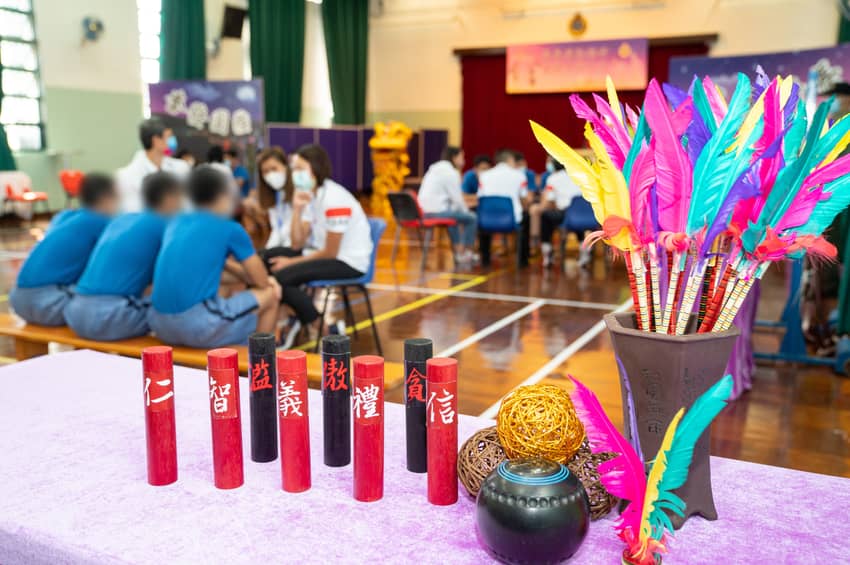
Elite athletes participate in an exchange activity with young persons in custody to help them build positive values.
Apart from providing diversified learning activities, teachers of the Education Unit of the Department would provide assistance for persons in custody to sit for public examinations. In 2021, the overall passing rate of persons in custody in public examinations was 64 per cent, and 5 adult persons in custody were awarded bachelor’s degrees.

Young persons in custody obtain satisfactory results in the Hong Kong Diploma of Secondary Education Examination.
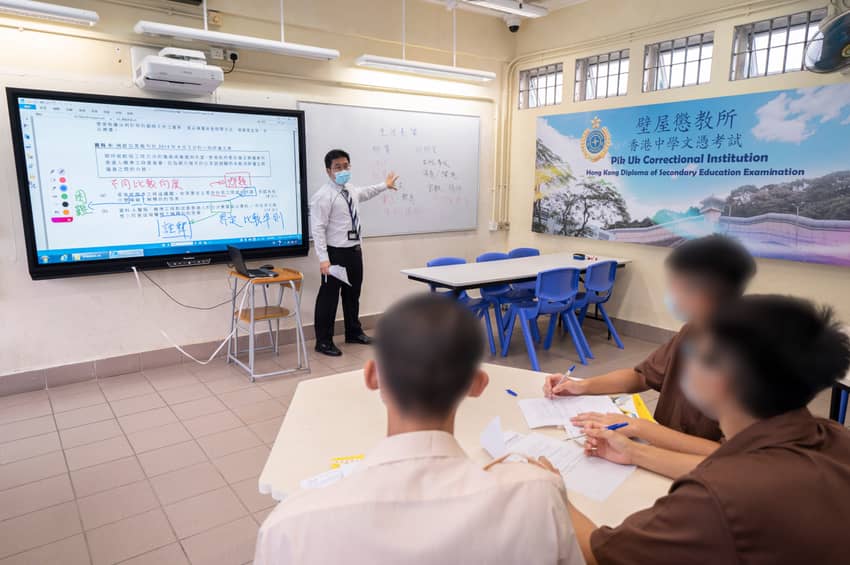
The CSD’s Education Unit provides basic education programmes for young persons in custody.
Vocational Training
In respect of vocational training, in 2021, about 40 market-oriented courses with a total of over 1 400 training places were provided by the Department in various correctional institutions for eligible adult persons in custody to enrol on a voluntary basis, with a view to enhancing their employability and facilitating their re-integration into society after release. The Department, in collaboration with local training bodies, organised the “Training Course on Virtual Reality Interior Design” and the “Advanced Training Course on Virtual Reality Logistics Management” in Tong Fuk Correctional Institution and Pik Uk Prison respectively to enable persons in custody to learn the new technologies widely used in the market nowadays. Moreover, apart from Café Rehapuccino which provides training on café operation, a bakery training workshop “Bake My Way” was set up in Pik Uk Correctional Institution to provide new western pastry and dessert making courses for young persons in custody so that they can receive more comprehensive western catering training.
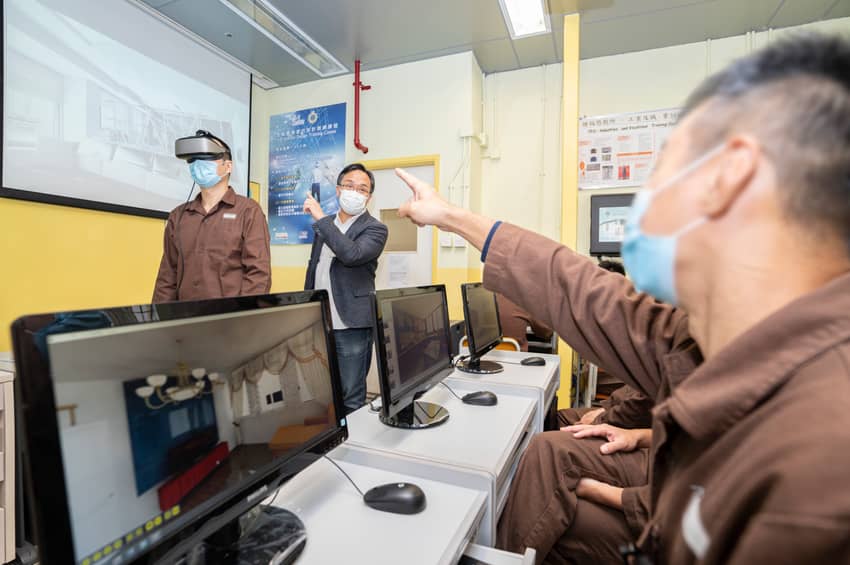
Persons in custody learn interior design through the application of virtual reality (VR) technology.
Industrial Production
The CSD has been providing diversified types of products and services for government departments in a cost-effective way. During the epidemic, the Department has proactively implemented a flexible production approach so as to meet the demand for various products from government departments. Through consolidating a number of production lines for personal protective equipment and introducing new production facilities, the Department is able to produce a more diversified range of protective gear including disposable caps, face shields, filter masks, protective gowns and shoe covers, etc. In early 2021, all filter mask workshops of the Department obtained ISO13485:2016 certification of Quality Management System for Medical Devices. The filter mask workshops not only provide solid support for the Government’s anti-epidemic work, but also foster a sense of social responsibility among persons in custody as they are given the opportunities to help maintain public health of Hong Kong and contribute to the anti-epidemic work. In addition, to support the COVID-19 Vaccination Programme, a total of about 4.5 million packets of “Together, We Fight the Virus” face masks were packaged by the CSD for distribution at various vaccination centres across the whole territory.
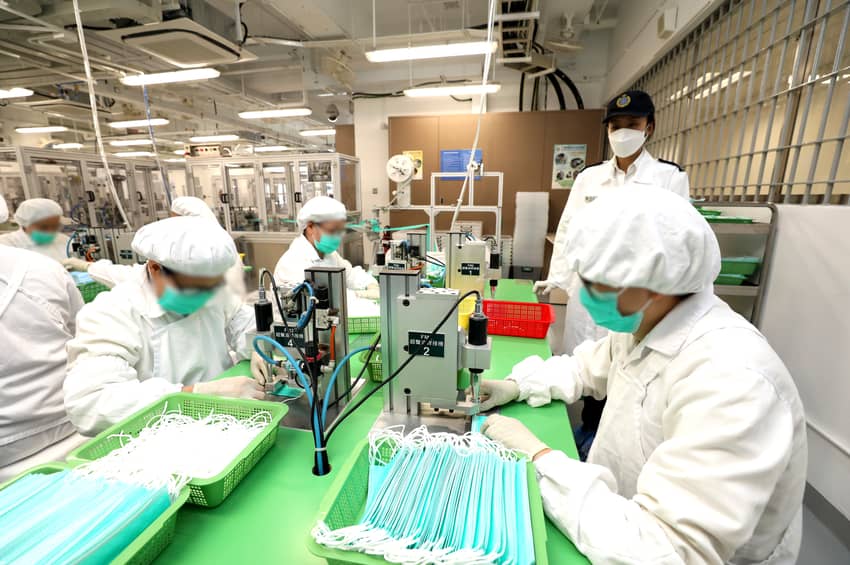
Persons in custody participate in mask production to contribute to the anti-epidemic work.
Recidivism Rate
The recidivism rate (i.e. the percentage of re-admission of local sentenced persons to correctional institutions following conviction for a new offence within two years after discharge) decreased from 22.5 per cent in 2018 to 20.9 per cent in 2019. The Department will continue to unite all sectors of the community to create a harmonious social environment conducive to rehabilitated persons’ re-integration into society.
Community Education
Owing to the Covid-19 epidemic, most of the rehabilitation programmes which require participants to attend interviews or take part in group activities at correctional institutions, such as Green Haven Scheme, Personal Encounter with Prisoners Scheme, Extended Training Camp and Summer Tour, etc. had to be suspended in 2021. Despite the epidemic, the CSD continues to instil positive values into students and young people through different ways or activities, including broadcasting multi-media videos on online platforms to disseminate the message of “leading a law-abiding and drug-free life as well as supporting offender rehabilitation” to young people, and co-organising with the Care of Rehabilitated Offenders Association an adventure-based educational programme named “Mission in Prison” (MIP). To further enhance racial inclusiveness, the CSD and the Hong Kong Justice of the Peace Association Limited co-organised the Hockey Fun Day cum Kick-off Ceremony of the “Project J Ethnic Minority Students Award Program” in August. Participants of the programme will later be arranged to take part in various activities under the “Rehabilitation Pioneer Project”. In October, the Department and the Chinese Manufacturers’ Association of Hong Kong jointly organised an interactive musical drama entitled “Own Your Life”, which was unprecedentedly co-performed by professional actors, students, correctional officers and young idols and attracted an audience of 1 600 teachers, students and guests. Besides, the CSD has expanded the establishment of the “Rehabilitation Pioneer Leaders” (RPL) with the total number of trainees growing up to over 170. Chinese-style foot drill practice has been specially included in their training which, together with the flag-raising training, would enhance RPL trainees’ sense of national identity.
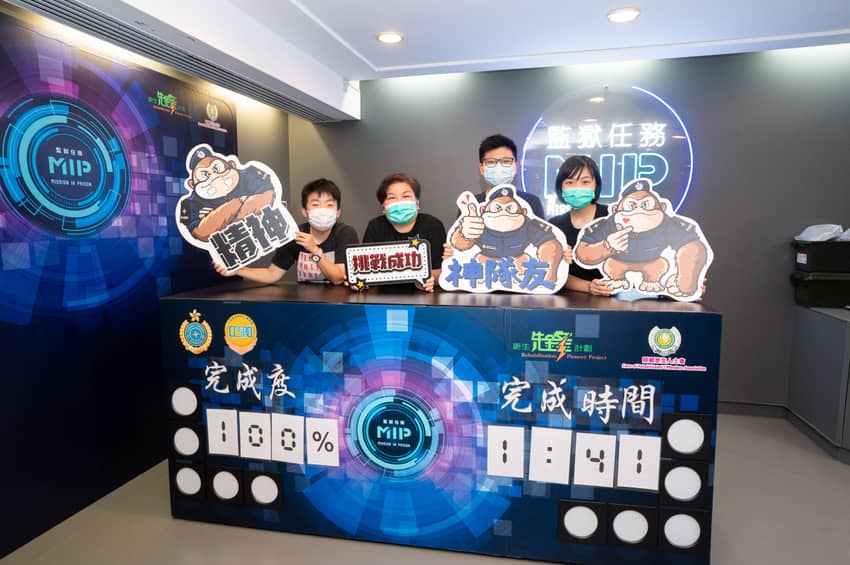
Various organisations have been invited to participate in the community education programme “MIP” under the Rehabilitation Pioneer Project.
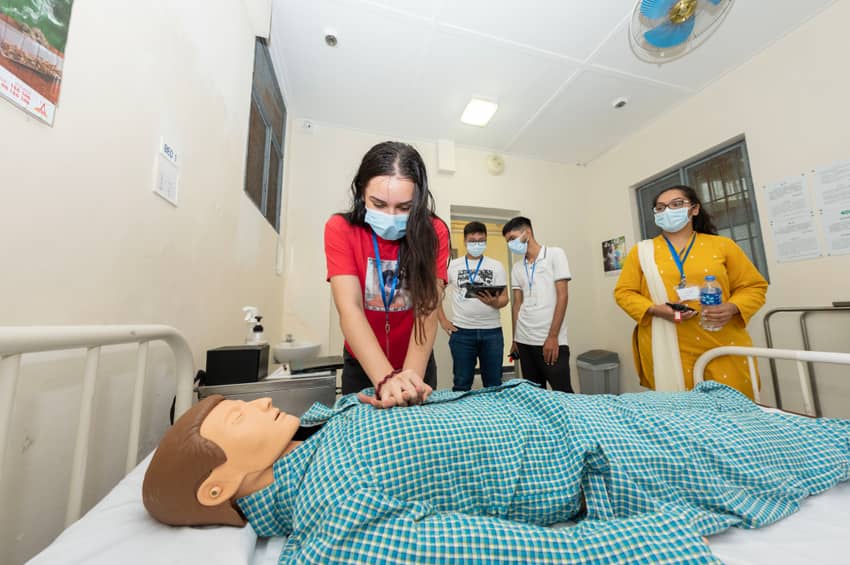
Through various activities under MIP, participants can learn more about the work of correctional officers and prison life, so as to enhance their awareness of the dire consequences of committing crime.
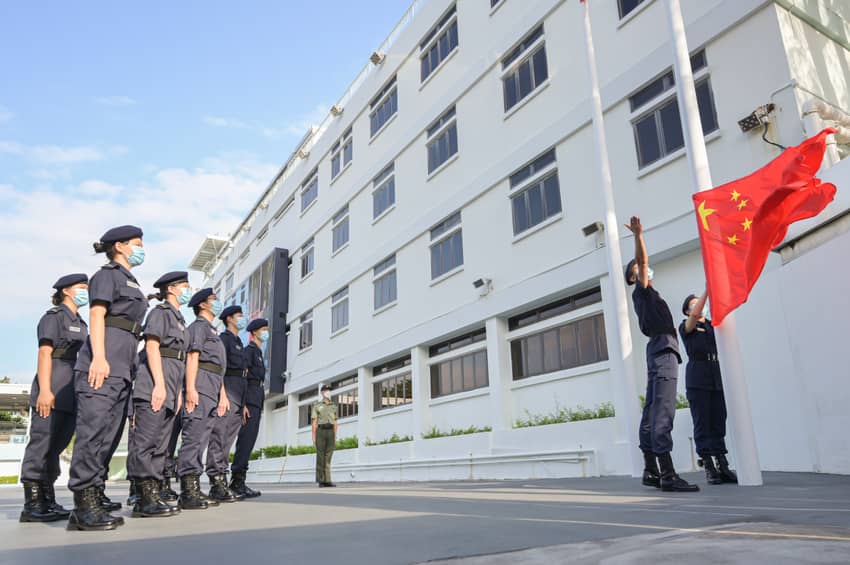
RPLs receive flag-raising training.
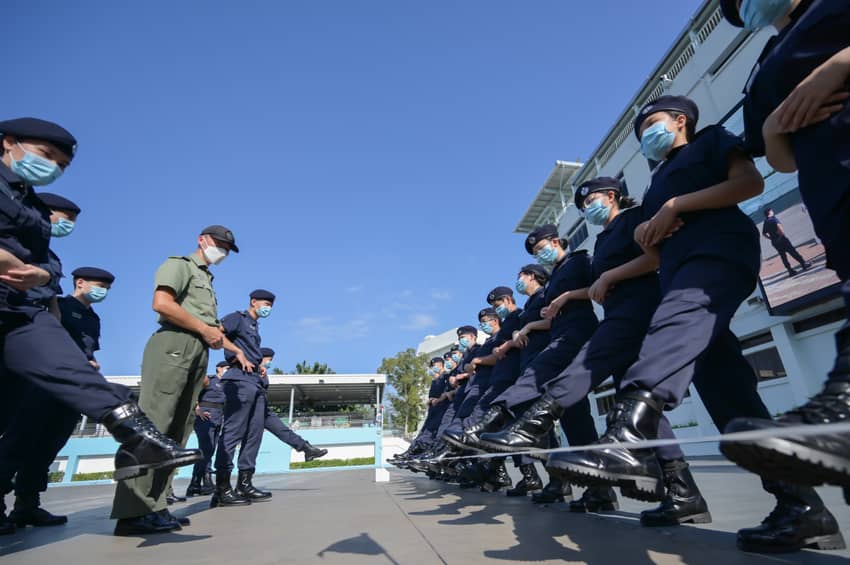
RPLs undergo the Chinese-style foot drill training.

Young people give musical and dance performances in the interactive musical drama “Own Your Life”.

A rehabilitated person shares how he committed crime and the lesson learnt during the interactive musical drama “Own Your Life” to enable students to obtain an understanding of the heavy price to pay for committing crime.
Human Resources
In 2021, a total of 41 Officers and 281 Assistant Officers II were recruited. It is expected that in 2022, around 50 Officers will be recruited, and the year-round recruitment for the post of Assistant Officer II will continue to fill the existing vacancies.
In response to the Grade Structure Review for the Disciplined Services Grades conducted earlier, the Department submitted proposals to the Standing Committee on Disciplined Services Salaries and Conditions of Service for enhancing the remuneration package of correctional officers. These included the introduction of new special job allowances applicable only to correctional officers, i.e. “allowance for working in an isolated environment” and “nursing duties allowance”, in order to reflect the uniqueness of the working environment of CSD’s staff and the professionalism of the relevant correctional officers. Besides, to tackle the challenge of staff wastage, the Department has implemented comprehensive measures to enhance staff welfare and their working environment for retaining talent. Meanwhile, a total of 216 retirees were recruited under the Post-retirement Service Contract Scheme to alleviate manpower shortage in correctional institutions.
In addition, in 2021, the Department continued to work closely with different support service centres for ethnic minorities and schools that the various joint activities attracted 87 NEC youths to apply for the vacancies of the CSD, of whom 5 were recruited as Assistant Officer II and 1 was recruited as Officer.
In order to further enhance its training programmes in terms of professionalism and recognition, the Staff Training Institute (STI) of the CSD has optimised the 26-week “Recruit Officer Training Course”, which was recognised by the Hong Kong Council for Accreditation of Academic and Vocational Qualifications in mid-2021 as a Level 5 programme in the vocational sector under the Qualifications Framework (QF), and was then renamed as “Professional Diploma in Correctional Management (Officer)” (i.e. pitched at the same QF Level as a local Bachelor’s Degree). In 2022, the Department will collaborate with the HKU School of Professional and Continuing Education to organise a QF Level 6 programme in the vocational sector entitled “Postgraduate Certificate in Correctional Governance and Leadership” (i.e. pitched at the same QF level as a local Master’s Degree) to enhance the professionalism and qualifications of senior officers.
The Department has also implemented the “Smart Training”, under which the professional level of the training is enhanced through innovation and technology to facilitate the nurturing of knowledge-based correctional officers. With the addition of the element of technology, the authenticity of learning experiences in various simulated institutional settings can be enhanced, so as to strengthen correctional officers’ capability in law enforcement and enhance their confidence, as well as encourage trainees to participate actively in the future development of “Smart Prison”.
The Department plans to retitle the STI of the CSD as the “Hong Kong Correctional Services Academy” in July 2022 to reflect the Department’s achievements in enhancing the professionalism of correctional officers and mark a new milestone in Hong Kong’s correctional work.
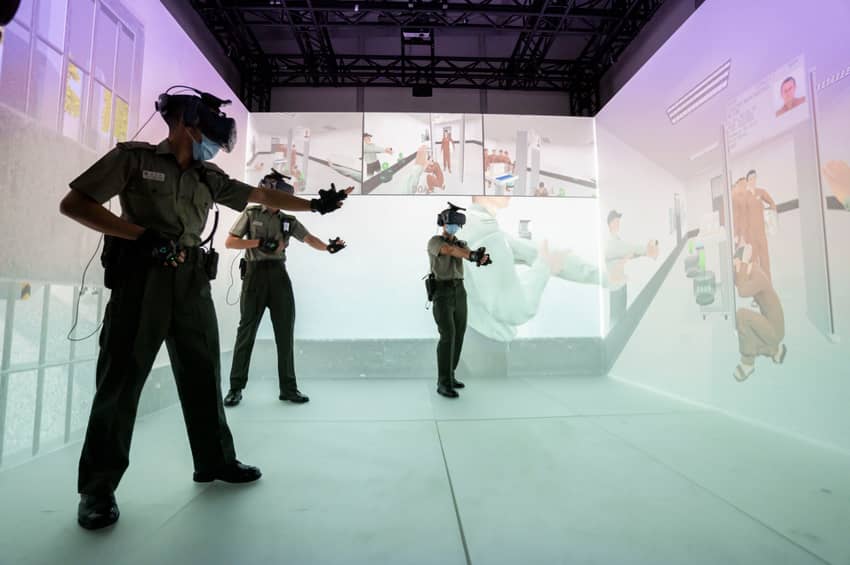
Trainees participate in VR training.
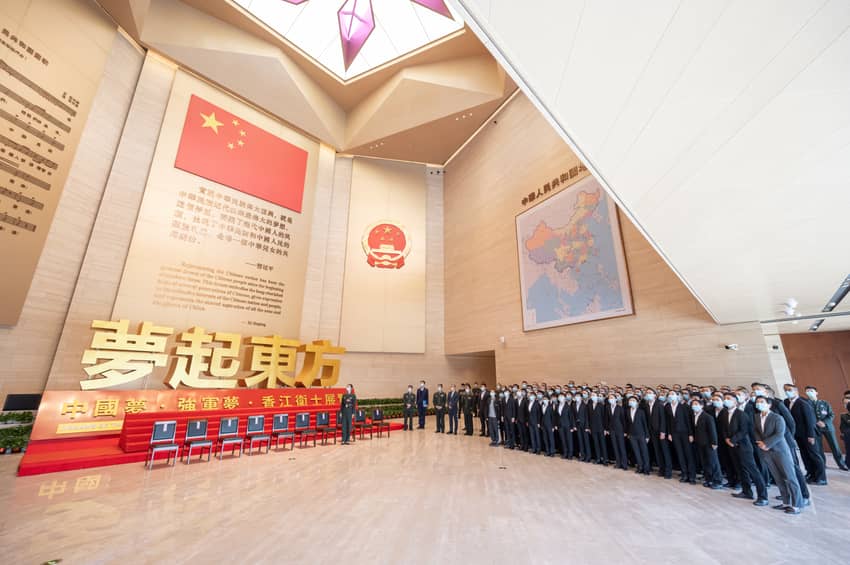
Trainees and RPLs visit the Chinese People’s Liberation Army Hong Kong Garrison Exhibition Center.
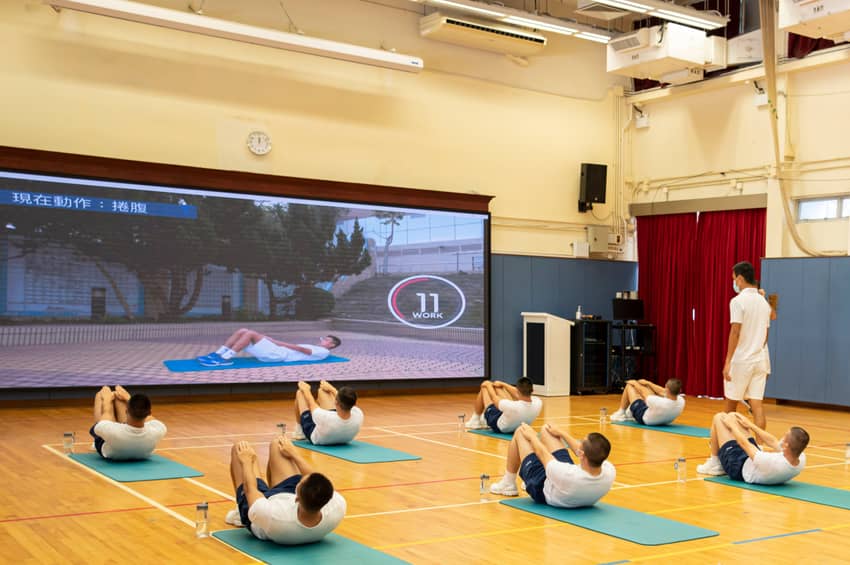
Making good use of technology in the fitness training for trainees.
Application of Advanced Technologies to Raise Management Effectiveness and Efficiency
The Department has been actively developing the “Smart Prison” protocol since 2018. Innovative technologies have been applied to modernise correctional facilities, with a view to enhancing management efficiency, the level of security of correctional institutions and the effectiveness of rehabilitation programmes. With reference to the experience gained from the trial runs of various technology projects over the past two years, the CSD has been improving various systems with technical staff, enabling the systems to match with institutional operations so as to develop the first-generation “Smart Prison” at Tai Tam Gap Correctional Institution, which has come into operation since May 2021.
Upon completion of the first-generation “Smart Prison”, the Department has continued to actively develop the “Smart Prison” protocol by introducing innovative “Smart Prison” projects in various correctional institutions. For example, the “Robotic Monitoring System 2.0” and the “Robotic Logistic System” have been introduced in Shek Pik Prison and Stanley Prison respectively, and the “Persons in Custody Integrated Intelligent Communication System” has progressively been extended to more institutions.
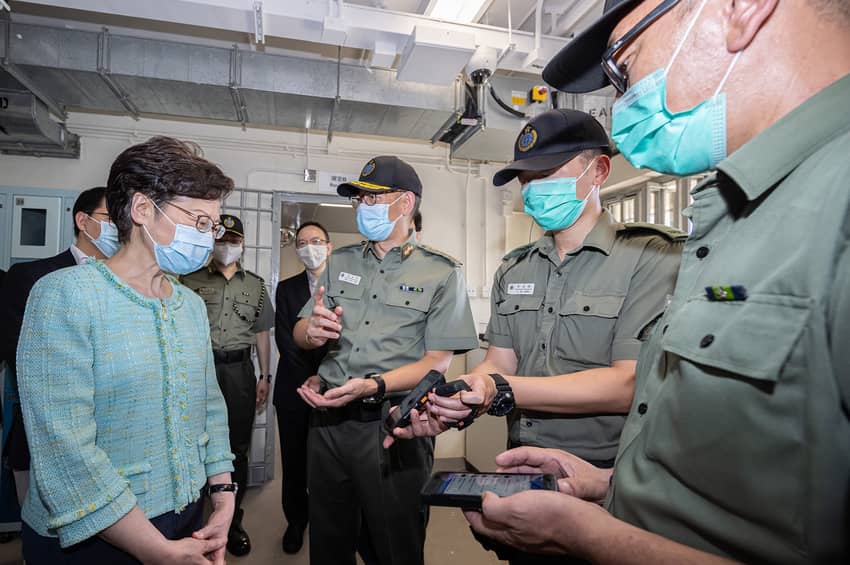
Officiating at the launching ceremony of the “Smart Prison” at Tai Tam Gap Correctional Institution, the then Chief Executive, Mrs Carrie Lam (first left), is briefed by correctional officers on the staff handheld device with data access and message delivery functions.
New Headquarters Building and Other Improvement Works
To cater for its future development and operational needs, the CSD started constructing the Correctional Services Department Headquarters Building at Shing Tai Road, Chai Wan in the first quarter of 2021 for completion in the fourth quarter of 2024 tentatively. The Department plans to bring together all its main offices and facilities currently located at various districts to the Headquarters Building so as to enhance its co-ordination capability and operational efficiency, which is conducive to the long-term development of the Department.
To speed up the provision of emergency support, strengthen institutional security and enhance management efficiency, the Department has obtained funding approval from the Legislative Council for the progressive installation of the Electric Locks Security Systems to replace the old systems of manually-operated locks at most of the passageways, cells and relevant facilities of maximum security institutions, and to replace the non-vented gates with electric grille gates to improve ventilation. In 2021, the works project at Tai Lam Centre for Women (non-redevelopment areas) was completed, while the works projects at Stanley Prison and Shek Pik Prison were still in progress and those at Pik Uk Correctional Institution and Siu Lam Psychiatric Centre were about to commence.
Besides, the CSD has been installing digital closed-circuit television (CCTV) systems at correctional institutions, and is studying the feasibility of incorporating the body temperature detection function into the CCTV systems to ensure a safe and healthy custodial environment. The relevant projects, upon completion, are expected to further enhance the security level and effectively reduce the risk of virus transmission within correctional institutions.
As the number of adult male remands has been on the increase, the CSD is planning to partially redevelop Lai Chi Kok Reception Centre in-situ to increase its capacity by 410 places so as to alleviate its prevailing overcrowding problem. The project has been approved by the Town Planning Board, and the Department will seek funding support according to the existing mechanism.
Staying Vigilant against Prolonged Epidemic
The prolonged outbreak of the COVID-19 epidemic has added burden on the CSD. Any slight lowering of its guard against the epidemic might lead to infection cases inside correctional institutions or even a large-scale outbreak of the virus, which could bring serious consequences. Bearing this in mind, all correctional officers have continued to remain vigilant and committed to duties. Multiple anti-epidemic measures have been taken, and advanced anti-epidemic technologies and equipment have been used to carry out disinfection and cleansing work in different areas of correctional institutions, in order to reduce the risk of transmitting the virus and safeguard the health of the staff and persons in custody.
In response to the Government’s appeal for vaccination, the Department has spared no effort in encouraging correctional officers to receive Covid-19 vaccination. As at 31 December 2021, over 98 per cent of correctional officers have been vaccinated.

CSD staff render support to the operation of a Community Vaccination Centre.
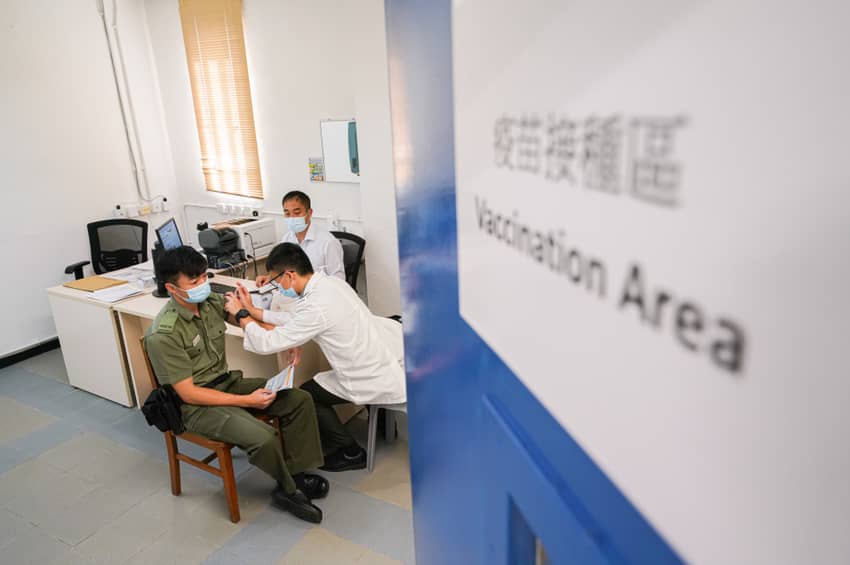
A correctional officer receives Covid-19 vaccine.
Conclusion
To keep pace with the development of society, the CSD has been agile and flexible to make adjustments and improvements in light of the changing circumstances. The Department would like to extend its sincere thanks to all correctional officers, community stakeholders and various organisations for their unwavering support over the years. The CSD also calls on all sectors of the community to continue to support the correctional work, and accept rehabilitated offenders to help them get back on the right track.
Wong Kwok-hing
Commissioner of Correctional Services
2022.03.24
Commissioner of Correctional Services
2022.03.24
